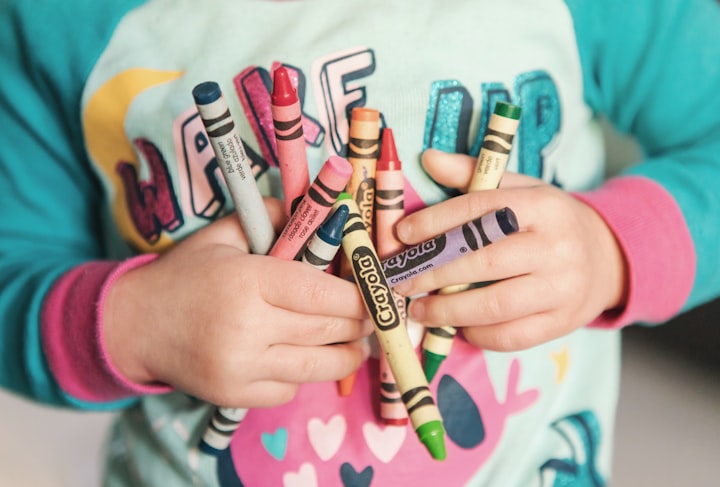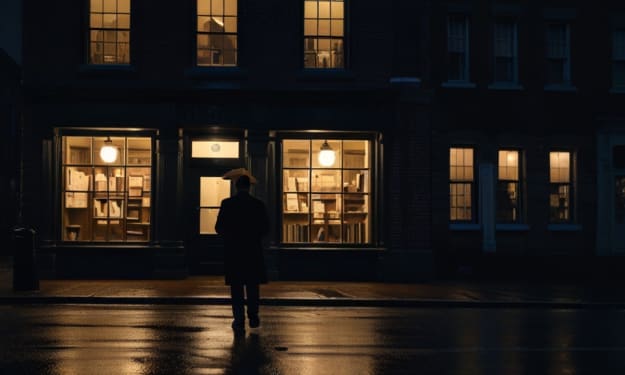Right now, creativity can seem frivolous. That’s when we need it most.
It’s time to rediscover play.

There’s a lot going on in the world, and with the threat of recession and war (to name but two challenges of modern living), it can be hard to see how the pursuit of creative practice is time well spent.
My aim here is to dig into what creativity is, and remind ourselves how it can help us each to uncork all that bottled-up guff that’s inside our heads.
What is creativity?
Creativity is sensory
Creativity turns the imaginary into the sensory.
There are five senses (not including the seeing-dead-people one) and to my mind, all creative work aims to stimulate at least one of them. Your favourite go-to might be; painting (sight), music (hearing), poetry (sight and hearing), pottery (touch and sight), or cooking (taste, smell and sight).
Something to consider is that if the balance of creativity versus consumption is skewed — for example, doom scrolling TikTok for an hour — we’re not gaining much. It’s the elements of play; a discovery of new sounds, tastes, techniques across the spectrum of senses that wake us up creatively.
Creativity is practiced optimism
If you’ve been feeling that there is little to be gained from creative time, maybe you can spend a little less time soaking up the drudgery of the news, especially regarding those events that you know, deep down, are just designed to trigger your sense of the macabre.
Or perhaps your sense of creative worth now comes from admiration (those bloody thumbs-ups) or from financial gain. As the anarchical capitalist, the Joker, put it:
If you’re good at something, never do it for free.
(That was before he set fire to the money.)
My belief is that committing time to being creative is an act of purposeful optimism. I don’t need to work on a new song for two hours. There’s nothing new under the sun. I know that. But grafting and crafting something that once only existed within my head, into something that is, somehow, outside of my head — something real — that experience is a miracle of our existence.
I recently visited an exhibition at the Tate Modern in London called Surrealism Beyond Borders. Much of the art comprised the artist’s attempts to express their horror or anguish, for example at harsh imperial rule. It reminded me that not all creative expression is hopeful, however, deciding to spend our time on a creative endeavour is a way of preaching to ourselves: my attempt to create beauty has worth.
It’s one way of reminding ourselves that we have intrinsic value, something to say, and that we can learn how to express what is inside us. All of which can help us build self-confidence.
Creativity is surprising
Have you ever been working on something and wondered, where did that idea come from? The ancients believed that the muse would come by and inspire artists. I imagine they looked a bit like those nymphs in Final Fantasy.
But, with practice and patience, we can all surprise ourselves.
One idea is to utilise the simple tool of documenting to enable you to review your ideas and processes more dispassionately after taking a break. We might only become aware of inspiration when we read or listen or watch back after the fact.
A famous example of this is Keith Richards, leathery guitar-pirate of the Rolling Stones. He awoke in the night with an idea for a rock and roll riff, fell asleep, and only remembered it when he listened back to the cassette he had recorded in the night. That riff? Satisfaction.
Speaking of which…
Creativity is satisfactory
Now, you might not agree. In fact, you might say it’s toil, effort, and you’re never satisfied with what you create, because you’re a perfectionist.
You might be right.
However, I believe that creative work (and I agree, it often requires hard work) when it has integrity is very satisfactory.
We’ve all done work where in the back of our minds, the whole time we’re thinking about how our teacher or our parents or our spouse or indeed the entire internet will perceive it. However, when the work you do has integrity at its core without the distraction of striving to be appealing — that is when you will look back and appreciate the fruit of your labours for their own merit.
Creativity is motivating
But you need motivation before you can get creative, right?
I recently took an online course on app building, and the most helpful tip was nothing to do with the topic. It went something like this:
If you can’t motivate yourself to do something (especially something complicated or time-consuming), tell yourself you will just do it for 20 minutes. After 20 minutes, you probably won’t feel like stopping.
Writing a novel is long, complicated and frustrating. After the initial buzz of the new project, the daunting nature of 80,000 words weighs on you and suddenly you can’t face writing a single page. But if you give yourself twenty minutes, set a timer, and go, then you’re just focussed on spending twenty minutes on a task, rather than attempting the full heroic saga. Twenty minutes a day is still one-hundred and twenty hours in a year. Imagine what you can accomplish in that time.
However, the strength of just cracking on for a short time is that the actual action of creating becomes self-motivating. As you get into the rhythm, the satisfaction of doing rather than dreaming takes over, and you become productive.
Creativity is play
You’ve made it this far: thank you for sticking with me. I’ll wrap things up on this ultimate point, which is that we must rediscover play.
We might remember our time as children and wonder where our sense of optimism, joy, and self-confidence went. But perhaps the sensation of being ‘child-like’ that we recall is more closely linked to the amount of free creative time that we were allowed as younglings, and conversely, how little creative play we allow ourselves now. Instead we opt for passive consumption as our default mode of rest.
Speaking of rest, the book of the same name by Alex Soojung-Kim Pang (which I highly recommend) contains an excellent chapter titled Deep Play. Pang describes the idea of deep play as an activity that is mentally absorbing, uses some of our work skills, yet offers different rewards to work (in media or scale or pace), and provides a living connection to the ‘players’ past.
Creative people don’t engage in deep play despite their high levels of activity and productivity; they’re active and productive because of deep play.
Pang uses the example of Churchill, who used painting as a means of deep play. In his book, Painting as a Pastime, Churchill states;
I know of nothing which, without exhausting the body, more entirely absorbs the mind. Whatever the worries of the hour or the threats of the future, once the picture has begun to flow along, there is no room for them. Every step may be fruitful. Yet there will stretch out before you an ever-lengthening, ever-ascending, ever-improving path.
Creative play is not about being productive. By allowing ourselves to become absorbed by the task at hand and stepping away from a culture obsessed with productivity, we will find ourselves on a new journey — one that might never end.
So today, just show up. Allow yourself twenty minutes of play. Think, dream, make a thing. Document it for yourself, so you can appreciate it later.
The world will be better for it.
Love, gto
Thanks for reading. I write about Creativity, Writing, Productivity, Optimism, and Craftsmanship. Follow along on Twitter @gtoworks.
About the Creator
Graham Ormiston
Imagineer. Maker. I care about creative and purposeful work. Writing about productivity, learning and craftsmanship.
Reader insights
Outstanding
Excellent work. Looking forward to reading more!
Top insights
Expert insights and opinions
Arguments were carefully researched and presented
Easy to read and follow
Well-structured & engaging content
Eye opening
Niche topic & fresh perspectives
On-point and relevant
Writing reflected the title & theme
Excellent storytelling
Original narrative & well developed characters
Heartfelt and relatable
The story invoked strong personal emotions
Compelling and original writing
Creative use of language & vocab







Comments (7)
Creativity is practiced optimism. Not for the artist and his/her creation and times, effort and imagination, plus resources. Creativity is a gift to some of us.
Creativity is motivating. Oh yes, it is.
Have you ever been working on something and wondered, where did that idea come from? The ancients believed that the muse would come by and inspire artists. Again, inspiration is everywhere.
If you’ve been feeling that there is little to be gained from creative time, maybe you can spend a little less time soaking up the drudgery of the news, Inspiration is everywhere for me.
My aim here is to dig into what creativity is and remind ourselves how it can help us each to uncork all that bottled-up guff that’s inside our heads. I like this thought.
Thanks for this message. Needed something uplifting in my day ^^ =)
Thank you for writing this. As a writer and artist, I often worry that creating for the sake of making something new is useless considering everything going on in the world. Thank you for the reminder creativity is necessary.